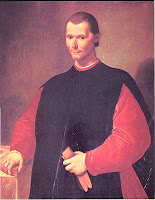 Please read Chapters 15-19 of Machiavelli's The Prince (either pp. 84-104 of the Signet edition or at the link below).
Please read Chapters 15-19 of Machiavelli's The Prince (either pp. 84-104 of the Signet edition or at the link below).Add a comment or two here giving your impressions of Machiavelli. Try to say something that would help another students trying to prepare on essay on Renaissance achievements.
http://www.fordham.edu/HALSALL/basis/machiavelli-prince.html

Jacob Kuhlman
ReplyDeleteMachiavelli was very influential on florence. His life was split up into 3 periods. The first period was his youth and it was occupied by things of study. well atleast that is what i took from this reading. The second period was spend in the service of the free republic of florence. This republic did very well for themselves. after he did that for a while he became a chancellor. In this role he was sent all over for people to retrieve things for people. IT seemed that through his whole life he was always doing things for other people. I get the impression that he cared about other people more than himself. Although that was his job. From what i read he was a great guy and he did everything with great detail!!
Interesting that the selection you looked at suggests positives. Machiavelli's name is typically associated with a kind of diabolic cleverness.
DeleteMachiavelli seems to be one that does what it takes to conqure the task at hand, showing that if you have to be mean, spiteful, and not a perfect person to fulfill it that what you have to do. He did cast a great fear among others and was not liked/loved by many, but with Machiavelli wanted it that way because to him it showed respect. His actions might have seemed selfish to some in the ways that he wanted to create achievement, but for him in order to do so he had to be all of those things; he did what was necessary to get the job done at all costs.
ReplyDeleteMachiacelli was a smart, wise and think outside the box kind of guy. How can one man not be loved though, for he helped his people through tough times? Easily by putting fear first instead of love. Fear is a powerful thing. When people fear they change the way things happen or what the unknown is. Fear moved the people in weird and good ways to strive to do something than love and fallow others. Fear got people to do something about what was going on in their society.Machiavelli made fear a good thing to help his people and to save them. So how could people not love him for he loved them to save them, Because of his way to fear him love prevailed in the end. Rachael Ham
ReplyDeleteMachiavelli uses his writing of The Prince as an avenue for providing the monarchs (mainly Medici, the Florentine ruler) with a new philosophical way of running a republican government. However, many of his ideals were not republic in any way, shape or form. Typically republican governments were run under the auspice of religion and/or moral standards. Machiavelli’s statements very clearly didn’t uphold any standard of morality or religion.
ReplyDeleteThe “manual” strays from the notion of religious integrity but rather in retaining power no matter “how”; any method, any means. Machiavelli has been associated with immoral behavior, when in reality, it can be seen as manipulation, or bait-and-switch methods. I guess it could be seen as “do as I say, not as I do” mentality. In essence, what Machiavelli was preaching through The Prince can be compared to today’s democratic ideals.
Chapters 14-19 of The Prince outline the virtues of being a prince, and what is to be considered acceptable behavior without being a pushover. The emphasis is on being practical, not ruthless necessarily. He continues to say that it is better to be feared than loved and always to keep ones enemies closer. Being “good” was no longer an option rather, it was perceived as a weakness.
“It must be understood… that a prince... cannot observe all of those virtues for which men are reputed good, because it is often necessary to act against mercy, against faith, against humanity, against frankness, against religion in order to preserve the state... he must stick to the good so long as he can, but being compelled by necessity, he must be ready to take the way of evil...”
While some did not agree with Machiavelli’s influences, others, after his death, came to idolize him and took his creed as face value. Mussollini and Hitler are two notorious for being considered ruthless. In today’s view, Machiavelli and his republican methods have been compared to the Founding Fathers of the United States, as well as past Presidents, such as Bill Clinton, whose foreign policy actions were seen as equal in their motivation to retain American power in international politics. Machiavelli, today, is viewed as one of the great thinkers – forward-moving, which is a deep contrast from how he was perceived during his time.